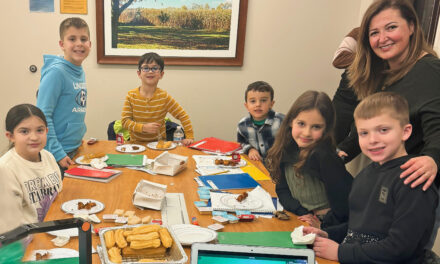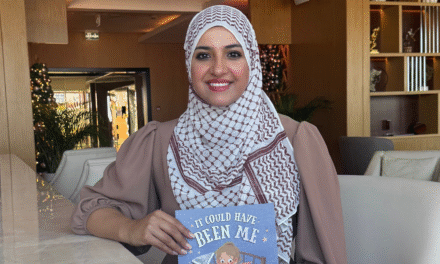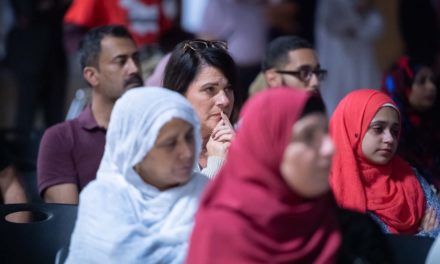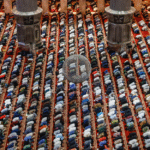
Photo credit: Dawud Academy blog
Christmas holiday season can be a time for Muslim parents to strengthen their children’s sense of identify and belonging.
“Mama, why don’t we celebrate Christmas?” 4 ½-year-old Iman asked her mother.
“We celebrate Eid. Other people celebrate other holidays,” Nour Malas answered. The Milwaukee native and her husband live in Lombard, Illinois, with their two daughters and son. Iman is the oldest.
“It’s a fun time of year,” Malas said. “We’ll take a drive to see the lights. We call them ‘holiday lights.’”
Today at preschool, Iman and her 4K classmates made a gingerbread house, an American Christmas tradition.
“I’m okay with that,” Malas said in an interview with Wisconsin Muslim Journal, “but if they asked Iman to be in a school play and it referenced Jesus as God, that’s where I’d draw the line.”
“It’s that time of year,” Frank Sinatra’s voice croons The Christmas Waltz over loud speakers everywhere. “Ev’ry song you hear seems to say, ‘Merry Christmas.’” The Christmas season is ubiquitous in American society, raising questions for Muslim parents about how to navigate it with their young children.
For Azhar Yunus, M.D., a child and adolescent psychiatrist in the Greater Milwaukee area, handling the Christmas season in a positive way is a topic he addresses with Muslim parents in the community and as a Muslim parent himself. When his children, now 18, 17, 15 and 13, were younger, he and his wife realized this is a topic that needs to be faced head on, he said yesterday in an interview with WMJ.
Begin with children’s need to belong
With Santa in shopping malls, and classmates excited about decorating trees and baking Christmas cookies, not to mention all the Christmas-themed TV commercials, our children “already have an understanding of what Christmas is,” Yunus says. “Perhaps their understanding is incorrect or incomplete,” but there is no avoiding exposure to Christmas if you grow up in America.
Step One is understanding that “our kids need to feel a sense of belonging in our American society,” he says. With that in mind, Yunus suggests parents do two things: 1) Discuss the importance of respect for one’s culture, beliefs and traditions and 2) Emphasize the similarities between the Muslim and Christian faiths. After that, go on to explain the differences between them, he said.
“Emphasize similarities first. We share many of the same prophets with Judaism and Christianity, and God created all those prophets. Tell them about Prophet Isa (Jesus), that like Prophet Mohammad (pbuh), he brought revelations from God, that he and his mother Mariam (Mary) are revered in Islam.
“We believe in Prophet Issa’s miracles, just as Christians do. We believe in his virgin birth, that he was able to speak in the cradle, heal the blind and heal lepers, and that he could bring people back from the dead (through the power of God). And we believe that Issa was a role model for us as human beings.”
Next, Muslim parents should move on to differences, Yunus says. “We cannot shy away from the differences. The main one is that in Islam, we do not believe the Prophet Jesus was the son of God. We believe he was a great prophet.
“I gave the example of Adam to my own children. We and Christians share Prophet Adam as God’s first creation of a human being but we don’t call him ‘the son of God.’ So, why would we say Jesus is the son of God?
“We can talk about Christmas, that it is not our holiday but that we must respect other people’s beliefs and practices. Tell them the importance of our own holidays, the two Eids. As parents, my wife and I worked to make those holidays an incredible celebration for our children. We want our children to understand that while there is Christmas for Christians, we have our holidays, too, and they are very special.”
With that said, acknowledge that Christmas is an important celebration for others in our community, he adds. “We can even partake in it by doing something for our Christian neighbors who are celebrating. This is their holiday and we can share in their joyous occasion by baking cookies for them or making something for them. We can send them greetings and give them something. That way, our kids still feel like they are part of it. And when our holidays come up, we can look for ways to include our neighbors.”
Join in the fun
Rather than trying to avoid Christmas celebrations (which is not possible anyway), use them as teaching moments for your children, Yunus suggests.
“When we show open respect for somebody’s religious beliefs, cultures and traditions, it in fact is a way of us doing dawah (showing examples of true Islam). People will look at us and say, ‘Wow, look at that. These Muslims are being so respectful. What a great religion!”
It is not haram (forbidden) to show respect for your neighbors’ beliefs, Yunus says. Don’t worry that baking cookies for a neighbor will confuse your children, he adds. “How can we expect someone to respect our beliefs if we don’t do the same thing?”
That doesn’t mean you blindly follow others’ customs and traditions, either, he says. Educating your children by sharing what you believe is the key.
“I thought my own parents did a wonderful job of navigating it with us,” Yunus recalls. “I went to Catholic school throughout my elementary, middle and high school education. The school would have Christmas parties, plays and potlucks. Our parents would let us participate. We’d bring dishes to share and we felt good about it. I thought it sent a positive message.
“We also expected the same reciprocity when it was time for our holidays. Our teachers, the principal and friends showed us respect by congratulating us and wishing us glad tidings on our holiday, understanding that we were going to take the day off from school to celebrate. That was really important to us.”
Allowing children to join in the holiday season in appropriate ways works if you have laid the foundation by teaching your children and discussing with them the similarities and differences in our faiths, he says.
Age-appropriate messaging
The way you explain Christmas to your 4-year-old will be different from the way you discuss it with your 14-year-old, Yunus notes.
What do you tell your 4-year-old who asks, “Why didn’t Santa come to our house?”
“I can tell you what we did,” Yunus volunteers. “In my own household, our children asked, ‘Is Santa gonna come down our chimney? Is he gonna leave us gifts?’
“When they were young, about 4, 5 or 6, we did give them small gifts but we told them they didn’t come from Santa. We told them, ‘God loves you so much, He gave you this gift.’ My wife hung pillowcases on the mantle where we put candy, cookies and other things. They loved it.
“We did something similar with the Tooth Fairy. When they lost a baby tooth, we’d put a quarter under their pillow and say, ‘This wasn’t from the Tooth Fairy. This is from God, who is kind and loving. And we should thank God for this and all His blessings.’
“After age 6 or so, they start to figure things out and you can explain more,” he adds. Take advantage of their questions and curiosity. Share your values, beliefs, thoughts and feelings with them.
That way, the Christmas holidays offer an opportunity to bring your family closer together and your children closer to their Muslim faith.
This article, written by Sandra Whitehead for Wisconsin Muslim Journal, was republished from Dec 2, 2022.













